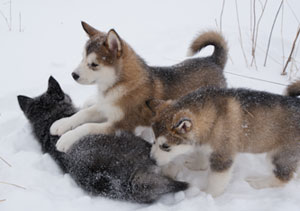If you’ve ever played with a puppy, chances are he started chewing on your hand. That is a natural part of the teething process, not a behavioral issue.
 Puppies go through the same type of teething that human babies go through. They start to get tiny needlelike teeth when they’re two to four weeks old, and when they’re around three months old they start to get their permanent teeth. This continues until the puppy is eight months old. To save your hands from becoming chew toys, American Kennel Club’s (AKC®) Canine Good Citizen® Director Mary Burch, Ph.D. offers the following tips on getting your puppy through the teething stage.
Puppies go through the same type of teething that human babies go through. They start to get tiny needlelike teeth when they’re two to four weeks old, and when they’re around three months old they start to get their permanent teeth. This continues until the puppy is eight months old. To save your hands from becoming chew toys, American Kennel Club’s (AKC®) Canine Good Citizen® Director Mary Burch, Ph.D. offers the following tips on getting your puppy through the teething stage.
- Puppy proof your home. Take care to puppy proof your home so your little one doesn’t have the opportunity to chew on something inappropriate, like your shoes. Also, make sure you aren’t the only readily available thing for your puppy to chew on. Have an assortment of chew toys to offer.
- Keep toys close. When playing with your puppy, keep the toys close by so you have an acceptable alternative when he starts to chew on you or something he’s not supposed to.
- Nipping and biting hard are not ok. Your puppy might nip or bite you too hard while playing and you’ll want to be diligent about teaching him that’s not ok. If he does nip or bite too hard, end the interaction. You can pull your hand away and say “OW!”, then leave the puppy for a few minutes. Make sure to then go back and try again so your puppy has the chance to learn the right way to act when playing.
Learn more about training and socializing your puppy here.


1 Comment
Thank you more than good